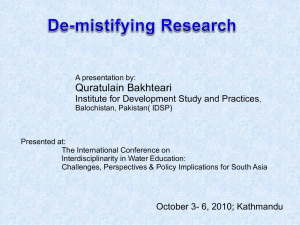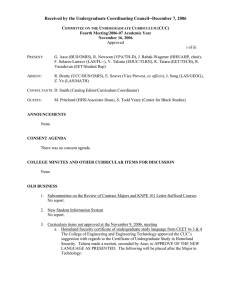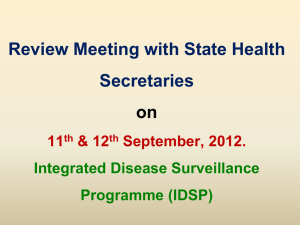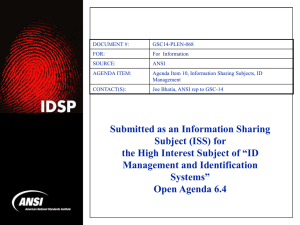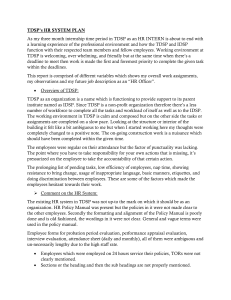Received by Undergraduate Coordinating Council—March 1, 2007
advertisement
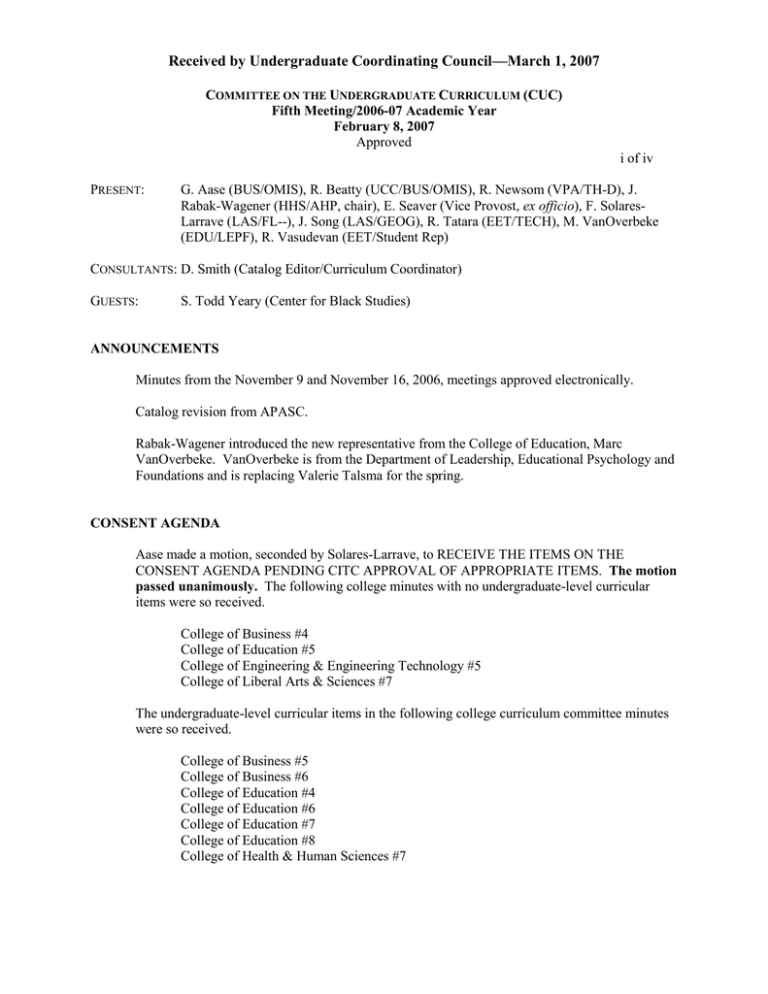
Received by Undergraduate Coordinating Council—March 1, 2007 COMMITTEE ON THE UNDERGRADUATE CURRICULUM (CUC) Fifth Meeting/2006-07 Academic Year February 8, 2007 Approved i of iv PRESENT: G. Aase (BUS/OMIS), R. Beatty (UCC/BUS/OMIS), R. Newsom (VPA/TH-D), J. Rabak-Wagener (HHS/AHP, chair), E. Seaver (Vice Provost, ex officio), F. SolaresLarrave (LAS/FL--), J. Song (LAS/GEOG), R. Tatara (EET/TECH), M. VanOverbeke (EDU/LEPF), R. Vasudevan (EET/Student Rep) CONSULTANTS: D. Smith (Catalog Editor/Curriculum Coordinator) GUESTS: S. Todd Yeary (Center for Black Studies) ANNOUNCEMENTS Minutes from the November 9 and November 16, 2006, meetings approved electronically. Catalog revision from APASC. Rabak-Wagener introduced the new representative from the College of Education, Marc VanOverbeke. VanOverbeke is from the Department of Leadership, Educational Psychology and Foundations and is replacing Valerie Talsma for the spring. CONSENT AGENDA Aase made a motion, seconded by Solares-Larrave, to RECEIVE THE ITEMS ON THE CONSENT AGENDA PENDING CITC APPROVAL OF APPROPRIATE ITEMS. The motion passed unanimously. The following college minutes with no undergraduate-level curricular items were so received. College of Business #4 College of Education #5 College of Engineering & Engineering Technology #5 College of Liberal Arts & Sciences #7 The undergraduate-level curricular items in the following college curriculum committee minutes were so received. College of Business #5 College of Business #6 College of Education #4 College of Education #6 College of Education #7 College of Education #8 College of Health & Human Sciences #7 Received by Undergraduate Coordinating Council—March 1, 2007 COMMITTEE ON THE UNDERGRADUATE CURRICULUM (CUC) Fifth Meeting/2006-07 Academic Year February 8, 2007 Approved ii of iv COLLEGE MINUTES AND OTHER CURRICULAR ITEMS FOR DISCUSSION None. OLD BUSINESS 1. Subcommittee on the Review of Contract Majors and KNPE 101 Letter-Suffixed Courses Song reported that she had received information from all the colleges. However, she thought that the information from the College of Engineering and Engineering Technology was incomplete. She will meet with Rabak-Wagener after the meeting to clarify what additional information is needed. 2. New Student Information System Seaver reported that they are about 40% along in the implementation. The implementation team has been meeting with the colleges to identify curricular policies that may need modification; and these are few. The majority of the changes will take place with academic policies and procedures. However, one item of special concern for the colleges will be the prerequisites. These will be monitored by the new system and colleges are being asked to look at whether or not their courses really need the prerequisites that are listed. Prerequisites will especially need to be evaluated for graduate courses for which undergraduate courses are listed as prerequisites. The next phase is to meet with the colleges about security and access. This will involve who gets access and to how much information. With the new system, the university will moving to paperless record keeping, from Admissions to Registration and Records to the departments, including posting grades. Full implementation will be for the fall 2008 admitting class. The admitting cycle starts summer 2007, so some things will be rolling out soon. There will be plenty of training opportunities for faculty and staff who will be using the system. 3. Curriculum items not approved at the November 9, 2006, meeting CSCI 240 from CLAS #2 Smith reported that the department is working on a solution to the issues with CSCI 240. 4. New courses (IDSP 312, IDSP 350, IDSP 410, IDSP 420, IDSP 440) and course revision (IDSP 493) for the Center for Black Studies (plus an additional new course proposal for IDSP 405) Rabak-Wagener reported that revised new course proposals had been received along with an overall rationale for the courses. She and Smith evaluated each proposal according to the checklist for new courses and Rabak-Wagener prepared a table listing each new course and what, if anything, each proposal was lacking. The first document under discussion was the three-page justification and rationale for the course proposals. One of the main rationales for the new courses is to bring NIU’s Center Black Studies up to national standards as mandated by the National Center for Black Studies (NCBS). Rabak-Wagener pointed out that the rationale included a list of content areas outlined by the NCBS and stated that the proposed Received by Undergraduate Coordinating Council—March 1, 2007 COMMITTEE ON THE UNDERGRADUATE CURRICULUM (CUC) Fifth Meeting/2006-07 Academic Year February 8, 2007 Approved iii of iv courses address most of those areas. Yeary noted that the new courses were created from IDSP 302, Topics in Black Studies. Discussion of each course followed. IDSP 312. Rabak-Wagener pointed out that there was a question regarding verification of non-duplication. Laverne Gyant, director of the Center for Black Studies responded that the School of Music did have a Black music class, but they have not offered it in the last 13 years, and the Department of Sociology agreed there was no duplication with their courses. IDSP 350. The concern with this proposal was that some of the objectives weren’t specific to the course. Yeary explained that the general course objectives connect to the holistic curriculum model in the rationale that connects with the NCBS standards and will satisfy the NCBS when they next evaluate NIU’s program. IDSP 405. Rabak-Wagener noted that the Department of Sociology should be consulted for non-duplication. Yeary noted that he will follow-up with that department. There was also a concern that the objectives should be more specific. Solares-Larrave suggested that since objective #6 is more specific, it should be moved up to the #3 spot. In addition, a phrase was added to #2 so it now reads, “Develop an intellectual time line of critical theory and thought about the social/historical condition of the Black male.” IDSP 410. Rabak-Wagner pointed out that she felt this proposal was complete including a statement about non-duplication and more specific objectives. IDSP 420. This proposal was complete except for more specific objectives. A copy of an email was provided to verify non-duplication. There were suggestions for improving the objectives and #1 and #2 now read: 1. Develop critical and strategic thinking skills for the social/historical analysis of Black religion in America. 2. Become proficient with analysis of the religious experiences of the African/African American community/ies. IDSP 440. This proposal also needed more specific objectives. The committee edited the first objective into three separate objectives. 1. Become proficient with historical analysis of the Black liberation movements. 2. Conduct critical analyses of the social context of the Black liberation movements. 3. Demonstrate understanding of the outcomes resulting from the Black liberation movements. The remaining objectives will be renumbered. IDSP 493—course revision. It was noted that the revision dealt with a name change only. The current title of the course is “African-Centered Research Methods.” The proposed title is “Afocentricity.” Rabak-Wagener asked the committee to look over the course descriptions for each new proposal to see if anything needed to be edited. There were some questions about the courses Received by Undergraduate Coordinating Council—March 1, 2007 COMMITTEE ON THE UNDERGRADUATE CURRICULUM (CUC) Fifth Meeting/2006-07 Academic Year February 8, 2007 Approved iv of iv that had prerequisites (IDSP 405, 410, and 440). Smith noted that she would edit the descriptions for “catalog language” and check with Registration and Records on the prerequisite questions. VanOverbeke asked about the description for IDSP 410, Psychology of the African American Experience, and why it did not include the word “psychology.” Yeary explained that they got approval for the course from the Department of Psychology because of the way the description is worded. He felt that the word “behavioral” is appropriate. Aase brought up the linkage to other courses that is found in all the proposals. He stated that since this is not a requirement of new course proposals that an explanation of why they are including the list of courses be provided to eliminate confusion. Song asked if the 400-level courses should have prerequisites. Yeary stated that there wasn’t a course students needed to have before taking the IDSP courses in order to be successful. It was also clarified that all of the courses are offered at least once a year. Aase made a motion, seconded by Newsom, to APPROVE THE NEW COURSE PROPOSALS FOR IDSP 312, IDSP 350, IDSP 405, IDSP 410, IDSP 420, IDSP 440, AND THE COURSE REVISION FOR IDSP 493, PENDING APPROVAL FROM THE DEPARTMENT OF SOCIOLOGY FOR IDSP 405. Motion passed unanimously. NEW BUSINESS None. ADDITIONAL BUSINESS There was a discussion on Certificates of Undergraduate Study. There are a couple proposals for new certificates in the College of Business, and Aase asked if they could require courses for the certificates that students would be taking for other programs. Seaver stated that he would look into this and get back to the college. The meeting was adjourned at 1:45 p.m. The next meeting will be March 8, 2007, 12:30, Altgeld 203. Respectfully submitted, Donna M. Smith
